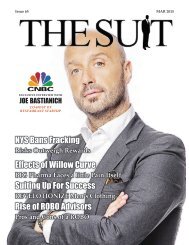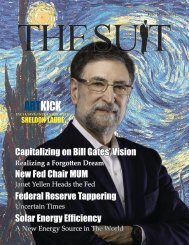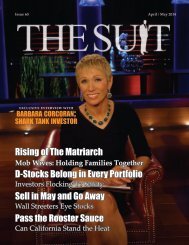o_19grqq7snim9mn019q11f7ds26a.pdf
Marcus Lemonis, a serial entrepreneur and host of the show “The Profit” on CNBC, is a true survivor in the corporate world. The native-born Lebanese business man endured the chaos of a civil war in Beirut and eventually moved to Miami. Lemonis was exposed to the automotive industry throughout his upbringing - his grandfather owning two of the largest Chevrolet dealerships in the United States and Lee Iacocca serving as the family friend and later mentor to Lemonis. On page 12, we conducted an interview with “Profit” host Marcus Lemonis, who offers struggling small businesses capital investment and his expertise in exchange for an ownership stake in the company. In the latter part of the magazine, we interviewed countless wealth advisors during these tough economic times. We recognize that some of the changes in 2013 and 2014 require relevance for financial planners. Therefore, the financial industry continues to push for more realistic standards and reforms.
Marcus Lemonis, a serial entrepreneur and host of the show “The Profit” on CNBC, is a true survivor in the corporate world. The native-born Lebanese business man endured the chaos of a civil war in Beirut and eventually moved to Miami. Lemonis was exposed to the automotive industry throughout his upbringing - his grandfather owning two of the largest Chevrolet dealerships in the United States and Lee Iacocca serving as the family friend and later mentor to Lemonis. On page 12, we conducted an interview with “Profit” host Marcus Lemonis, who offers struggling small businesses capital investment and his expertise in exchange for an ownership stake in the company. In the latter part of the magazine, we interviewed countless wealth advisors during these tough economic times. We recognize that some of the changes in 2013 and 2014 require relevance for financial planners. Therefore, the financial industry continues to push for more realistic standards and reforms.
Create successful ePaper yourself
Turn your PDF publications into a flip-book with our unique Google optimized e-Paper software.
y diane alter<br />
On a Roll: Investment in Start-ups<br />
If the first quarter of 2014 provides<br />
any indication for the rest of the<br />
year, it appears this may be the<br />
most fruitful year in more than a decade<br />
for start-ups headed to making<br />
initial public offerings. According to<br />
a Thomson Reuters report, the time<br />
period between the start of January<br />
through the end of March marked the<br />
largest amount of investment by venture<br />
capitalists since the second quarter<br />
of 2001.<br />
That is welcome news to Brian Altounian,<br />
president of Alliance Acquisitions<br />
in West Hollywood, California.<br />
His firm specializes in taking<br />
start-ups through their growing pains,<br />
attracting investors and making initial<br />
public offerings. Just last month,<br />
one of Alliance’s portfolio companies,<br />
WOWIO, Inc., (OTCBB:WWIO) successfully<br />
completed its march to the<br />
public market and is now trading on<br />
the OTC Market, providing an exit for<br />
early-stage investors.<br />
“In the last ten to 15 years, I have spent<br />
a lot of my time in the early stage<br />
start-up industry, working from the<br />
perspective of building value in these<br />
companies and creating a unique opportunity<br />
for investors,” he said.<br />
Despite the uncertainty still surrounding<br />
implementation of the Patient<br />
Protection and Affordable Care Act,<br />
also known as Obamacare, Altounian<br />
views its servicing needs as a hotbed of<br />
opportunity. His thinking is directly in<br />
line with reports from the Renaissance<br />
Capital IPO Center, indicating that 55<br />
percent of Q1 2014 IPO filings were<br />
health care companies, and with Venture<br />
Beat – an online magazine tracking<br />
the activity of venture capitalists.<br />
In February 2014, Venture Beat predicted<br />
that digital health IPOs, already<br />
outnumbering tech IPOs, will soon<br />
also supersede them in value.<br />
“Whether you think good or bad<br />
about Obamacare, the reality is that<br />
any company that can facilitate compliance<br />
with the requirements of<br />
Obamacare, the management of health<br />
care, or anything to do with pharmaceuticals<br />
is going to have success right<br />
now,” Altounian believes. “Anything<br />
that is helping to navigate the new<br />
Obamacare line – that is what is hot.”<br />
While the role of angel investors has<br />
received a lot of attention in the past<br />
few years, for Altounian they aren’t<br />
necessarily the first direction<br />
he turns toward when<br />
seeking funding for a<br />
start-up.<br />
“Occasionally I find<br />
a synergistic angel<br />
investor with a particular<br />
passion for<br />
an industry in which<br />
there is a company<br />
we are working<br />
with,” he said. “But<br />
I really like working<br />
with the smaller investors who have<br />
discretionary income – such as successful<br />
professionals who are accredited<br />
and would like to dabble a bit to build<br />
the “risk” side of their portfolio. (They)<br />
have the penchant for a little higher<br />
risk than what the average angel investor<br />
tends to be able to swallow. Of<br />
course, that’s usually where the greatest<br />
rewards come from a well.”<br />
Altounian is also closely watching the<br />
future role that crowdfunding will<br />
play in the development and funding<br />
of start-ups. He knows the SEC has<br />
provided initial guidance for the use<br />
of crowdfunding, but doesn’t think<br />
the agency is finished establishing the<br />
rules.<br />
“I love the idea of crowdfunding – and<br />
that everybody is talking about it,”<br />
Altounian said. But he believes too<br />
many investors are hesitant because it<br />
is a method or idea currently existing<br />
without a full set of boundaries for the<br />
playing field.<br />
“No one wants to be shut down until<br />
all the rules are established. It is something<br />
we will want to use in the future<br />
because it is a great way to introduce<br />
your company to a broad selection of<br />
new investors. However, until there is<br />
very clear guidance and all the rules<br />
are set in place, we just won’t use it<br />
yet,” Altounian emphasized.<br />
www.alliance-acquisitions.com<br />
THE SUIT MAGAZINE p.61










